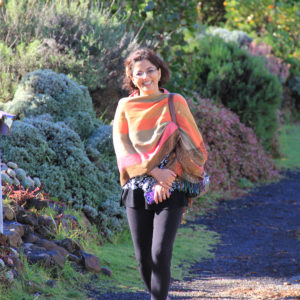IAFOR Vladimir Devidé Haiku Award 2016 Grand Prize Winner and Guest Judge 1st Choice Suraja Roychowdhury of the United States gives us a glimpse into her interest in the poetic form of haiku and the inspiration for her award-winning 2016 composition.
How did you first become interested in haiku?
I took a haiku class at the local public library in Lexington and fell in love with Basho’s frog haiku. There was no stopping after that.
What is it about haiku that particularly attracts you?
I like reading other poetic forms, especially sonnets and other rhyming poetry, but I cannot, for the life of me, write a good one! Haiku is an accessible form of poetic expression for me. I love the immediacy of the experience, the “aha” moment, the flavours that linger long after the words are read. In such a short poem every word becomes meaningful, and I enjoy the discipline that brings that chiselling about, if you will…
What do you think makes a good haiku?
That’s a loaded question, because there’s so much of a personal bias to it. But here goes. A good haiku, IMHO, should evoke an emotion, be it an “aha” moment, wabi-sabi, yugen. I’m not a fan of 5-7-5, so I like an economy of words that pack the most impact, that leave me thinking. But I’m not averse to a good 5-7-5 either. Nature or human experiences both resonate with me, and I enjoy reading multilayered haiku.
What inspired your 2016 Grand-Prize-winning haiku?
sunny afternoon
a shadow
on the mammogram
That haiku was a slice straight from my life. I had a mammogram and there was an abnormality. That was the moment I captured in the haiku. That shadow lingered and overpowered every other thought for a few days until further investigation showed that it was all fine.
What is your favourite haiku?
There are several I really like, but my favorites have to be Basho’s frog haiku, Issa’s village flooding with children and Shiki/Buson’s you go/I stay/two autumns.
Suraja Roychowdhury is originally from India but migrated to the United States for graduate studies in the 1980s. She now lives in Lexington, Massachusetts. She obtained her PhD in Pharmacology and worked for several years as a clinical drug development researcher. She then changed careers and is now a Chinese Medicine practitioner. Somewhat concurrently with the career change, she became acquainted and fell in love with haiku and other Japanese poetic forms such as tanka and haibun. She has had a few haiku published (and even more rejected!), and currently teaches Advanced Haiku on allpoetry.com, a wonderful site with a very active Oriental poetry-writing community. She is married and has two children. Besides writing, she loves reading, Indian classical music and travel. In 2016 her entry to the IAFOR Vladimir Devidé Haiku Award was selected as both Grand Prize Winner in the main competition and 1st Choice for the Guest Judge special selection on the theme of “justice”.


